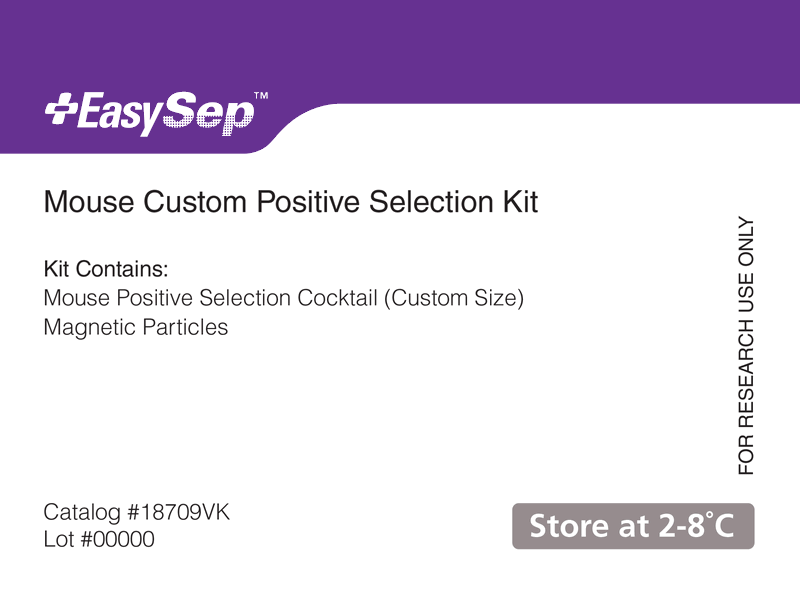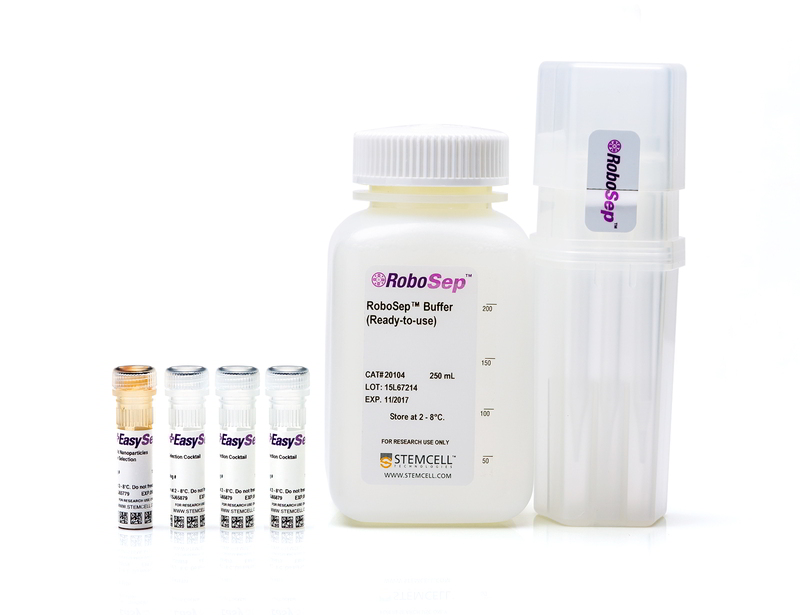EasySep™ Mouse Custom Positive Selection Kit
Immunomagnetic Positive Selection Kit
概要
The EasySep™ Mouse Custom Positive Selection Kit is designed to isolate any cell type of interest from single cell suspension of spleen or other tissues by positive selection. STEMCELL Technologies offers a wide selection of antibodies for custom separation and will work with you to isolate a cell type of interest. Please contact our technical support team at techsupport@stemcell.com for more information.
Components
- EasySep™ Mouse Custom Positive Selection Kit (Catalog #18709)
- EasySep™ Mouse Custom Positive Selection Cocktail
- EasySep™ Magnetic Particles, 1 mL
- RoboSep™ Mouse Custom Positive Selection Kit with Filter Tips (Catalog #18709RF)
- EasySep™ Mouse Custom Positive Selection Cocktail
- EasySep™ Magnetic Particles, 1 mL
- RoboSep™ Buffer (Catalog #20104) x 2
- RoboSep™ Filter Tips (Catalog #20125) x 2
Contains
Magnet Compatibility
• EasySep™ Magnet (Catalog #18000)
• "The Big Easy" EasySep™ Magnet (Catalog #18001)
• RoboSep™-S (Catalog #21000)
Subtype
Cell Isolation Kits
Cell Type
B Cells, Dendritic Cells, Granulocytes and Subsets, Hematopoietic Stem and Progenitor Cells, Macrophages, Marrow Stromal Cells, Mesenchymal Stem and Progenitor Cells, Monocytes, Mononuclear Cells, Myeloid Cells, NK Cells, Other, Plasma, T Cells
Species
Mouse
Sample Source
Bone Marrow, Other, Spleen
Selection Method
Positive
Application
Cell Isolation
Brand
EasySep, RoboSep
Area of Interest
Immunology, Stem Cell Biology
技术资料
数据及文献
Publications (2)
Cancer cell 2009 FEB
Regulation of the IL-23 and IL-12 balance by Stat3 signaling in the tumor microenvironment.
Abstract
Abstract
Interactions between tumor and immune cells either enhance or inhibit cancer progression. We show here that Stat3 signaling within the tumor microenvironment induces a procarcinogenic cytokine, IL-23, while inhibiting a central anticarcinogenic cytokine, IL-12, thereby shifting the balance of tumor immunity toward carcinogenesis. Stat3 induces expression of IL-23, which is mainly produced by tumor-associated macrophages, via direct transcriptional activation of the IL-23/p19 gene. Furthermore, Stat3 inhibits NF-kappaB/c-Rel-dependent IL-12/p35 gene expression in tumor-associated dendritic cells. Tumor-associated regulatory T cells (Tregs) express IL-23 receptor, which activates Stat3 in this cell type, leading to upregulation of the Treg-specific transcription factor Foxp3 and the immunosuppressive cytokine IL-10. These results demonstrate that Stat3 promotes IL-23-mediated procarcinogenic immune responses while inhibiting IL-12-dependent antitumor immunity.
Nature medicine 2005 DEC
Inhibiting Stat3 signaling in the hematopoietic system elicits multicomponent antitumor immunity.
Abstract
Abstract
The immune system can act as an extrinsic suppressor of tumors. Therefore, tumor progression depends in part on mechanisms that downmodulate intrinsic immune surveillance. Identifying these inhibitory pathways may provide promising targets to enhance antitumor immunity. Here, we show that Stat3 is constitutively activated in diverse tumor-infiltrating immune cells, and ablating Stat3 in hematopoietic cells triggers an intrinsic immune-surveillance system that inhibits tumor growth and metastasis. We observed a markedly enhanced function of dendritic cells, T cells, natural killer (NK) cells and neutrophils in tumor-bearing mice with Stat3(-/-) hematopoietic cells, and showed that tumor regression requires immune cells. Targeting Stat3 with a small-molecule drug induces T cell- and NK cell-dependent growth inhibition of established tumors otherwise resistant to direct killing by the inhibitor. Our findings show that Stat3 signaling restrains natural tumor immune surveillance and that inhibiting hematopoietic Stat3 in tumor-bearing hosts elicits multicomponent therapeutic antitumor immunity.



